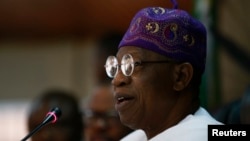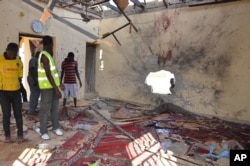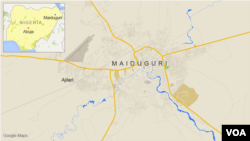Earlier this year, Nigerian President Muhammadu Buhari gave his country's military a deadline of December to defeat the six-year-old Boko Haram insurgency.
Whether the troops have met that deadline depends on how you define “defeat.”
A military spokesman says soldiers have pushed the insurgents out of territory they controlled in the northeast, as well as degraded their ability to stage large-scale attacks.
Some residents of the northeastern city of Maiduguri, the capital of Borno State, say they feel safer; but, soldiers who spoke to VOA say they’re ill-equipped and outgunned, while a government official in Borno State says some areas remain unsafe.
Meanwhile, a multinational task force has yet to be deployed, raising questions about how serious the region is about taking on a group that was this year ranked the world’s deadliest terrorist organization by the Global Terrorism Index.
“The problem is so complex and so difficult,” said David Zounmenou, a senior research fellow at the South Africa-based Institute for Security Studies.
Even though an offensive by Nigeria and neighboring countries along with foreign mercenaries scored victories against Boko Haram earlier this year, Zounmenou says the insurgency is far from defeated. “It’s now made the menace almost spread across [borders], and made them even more volatile and more dangerous than ever.”
Buhari seemed to realize this as he announced recently that the December deadline could be extended.
Military on top?
Defense spokesman Rabe Abubakar insists the military has the upper hand against the group. In recent months, they’ve killed top commanders and rescued scores of captives.
“We have already beaten them, as far as I’m concerned,” he said, because the military has stopped them from taking over territory and carrying out large-scale attacks. He acknowledged, however, the military has not been able to stop them from targeting civilians in bus stations or marketplaces.
“Suicide bombings and other attacks on soft targets are things which no military can, overnight, wipe out,” Abubakar said.
Maiduguri resident Aliyu Biu says he feels safer in the city. The Borno State capital is the birthplace of the sect and has been attacked repeatedly.
“You see, presently, we sleep with our eyes closed. We move around town with no blockades. We no longer experience people going into houses to slaughter people. We don’t experience gunshots right, left and center,” Biu said.
The city remains a target, however. A suicide bomber killed eight people on Maiduguri’s outskirts late last month.
Two soldiers deployed 50 kilometers away from the capital told VOA that they have neither the weapons nor the ammunition they need to take on the group. And despite the military’s assurances that they’ve retaken all territory Boko Haram controls, the soldiers say three local government areas remain in the insurgents’ hands.
Meanwhile, a state government official in Borno State said attacks occur sporadically across the vast area, and the overstretched police and military cannot prevent them.
The group is thought to move between Nigeria and its neighbors Chad, Cameroon and Niger.
Troops from all four countries, along with Nigeria’s western neighbor Benin, were supposed to deploy against the group in a multinational joint task force that would patrol the porous borders, but that has yet to happen.
Zounmenou said the deployment of the force has been held up by the dropping price of crude oil.
Oil exports are a top revenue-producer for Nigeria and for Chad, which is a crucial contributor to the task force. Distrust among the region’s leaders has also stymied the deployment.
“It would be a big blow and offer opportunities to Boko Haram and other radical groups that African leaders are not really serious about... challenging them” if the force isn’t deployed, Zounmenou said.
The insurgency has displaced more than 2.1 million people. Thousands more have been killed.
Boko Haram violence killed over 6,000 people last year, according to The Global Terrorism Index, and by all accounts the group has killed several thousand more in 2015.
Kareem Haruna contributed to this report from Abuja, Ardo Hazzad from Bauchi, Nigeria.






